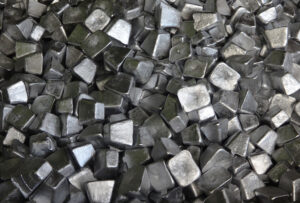
In January 2025, Ukraine increased imports of lead and lead products by 4.3 times compared to the same period in 2024, to $580 thousand (in December – $1.193 million). At the same time, lead exports decreased by 26.3% to $643 thousand (December: $583 thousand).
Lead is currently mainly used in the production of lead-acid batteries for the automotive industry. In addition, lead is used to make bullets and some alloys.

Insurance company Euroins Ukraine (Kyiv) will increase its authorized capital to UAH 168.190 million by conducting an additional issue of shares in the amount of UAH 90.250 million.
According to the insurer’s information posted in the NSSMC system, this decision was made by the shareholders at a meeting on February 19.
According to the report, it is planned to place 9.025 billion shares with a nominal value of UAH 0.01, at a placement price of UAH 0.02.
It is also specified that the placement of shares may lead to a change in the owners of a significant stake, an increase in the shareholding of shareholders who already own 5% or more of the shares, namely: JSC Euroins Insurance Group (Bulgaria) – 92.728%, PrJSC European Travel Insurance – 5.745%.
The raised financial resources from the share placement are planned to be used in full to bring the company’s activities in line with the requirements of the Law of Ukraine “On Insurance” regarding solvency and investment activities. Namely, it is planned to place 70% of the funds received in the course of the issue in bank deposits, 20% in government bonds of Ukraine and other securities, and 10% in the centralized insurance reserve funds of the Motor (Transport) Insurance Bureau of Ukraine.
Euroins Ukraine is a universal insurance company that has been operating in the Ukrainian market since 1992. It is a part of the Bulgarian insurance group Euroins, which is one of the largest independent insurance groups operating in Central, Eastern and South-Eastern Europe.

In January 2025, imports of aluminum and aluminum products increased by 9.4% year-on-year to $36.658 million (in December – $36.943 million). In January, aluminum exports increased by 17.9% to $9.431 million, while in December this figure was $8.426 million.
Aluminum is widely used as a structural material. The main advantages of aluminum are its lightness, stampability, corrosion resistance, high thermal conductivity, and non-toxicity of its compounds. In particular, these properties have made aluminum extremely popular in the production of cookware, aluminum foil in the food industry, and packaging. The first three properties have made aluminum the main raw material in the aviation and aerospace industries (recently it has been replaced by composite materials, primarily carbon fiber). After the construction and production of packaging, such as aluminum cans and foil, the energy sector is the largest consumer of the metal.

The housing price index in Ukraine reached 112.7% in 2024, up from 114.5% in 2023 and 113% in 2022, the State Statistics Service (Ukrstat) reported.
According to it, in the primary market, housing prices rose by 15% in 2024, accelerating growth compared to 2023, when the figure was 12.8%. At the same time, one-bedroom apartments went up by 14.9%, two-bedroom apartments by 15.3%, and three-bedroom apartments by 14.8%.
At the same time, housing prices in the secondary market slowed down. Thus, the secondary market rose by 11.6% on average, which is 4 percentage points lower than in 2023. One-bedroom apartments in the secondary market went up by 11.5%, two-bedroom apartments by 11.9%, and three-bedroom apartments by 11.5%.
According to the agency, in the fourth quarter of 2024, the house price index fell to 113.1% compared to 116.1% in the fourth quarter of 2023. In particular, in October-December 2024, prices in the primary market increased by 15.8% compared to 14.6% in October-December 2023, while in the secondary market, the price growth rate slowed down to 11.9% compared to 17%, respectively.
In the fourth quarter of 2024, the housing price index increased by 0.6 percentage points to 103.5% compared to the third quarter. In particular, in the primary market, housing prices rose by an average of 4%: one-bedroom apartments – by 3.9%, two-bedroom apartments – by 4%, three-bedroom apartments – by 4.1%.
In the secondary market, housing prices rose by 3.3% in the fourth quarter of 2023, compared to 2.5% in the third quarter. One-room apartments rose in price by 3.2%, two- and three-room apartments – by 3.3% and 3.4%, respectively.
The State Statistics Service noted that the figures exclude the temporarily occupied territories and parts of the territories where military operations are (were) underway.

State-owned PrivatBank increased its net profit by 6.3% to UAH 40.14 billion in 2024, retaining its leadership in the top five most profitable banks in the country, according to the National Bank of Ukraine (NBU).
Privat is followed by two other state-owned banks, Oschadbank and Ukreximbank. Oschad increased its net profit by almost 2.5 times to UAH 14.83 billion compared to Eximbank, moving it to third place with a profit of UAH 5.56 billion (+71% y-o-y).
The fourth and fifth positions were taken by banks with foreign capital: Raiffeisen and OTP. The former’s net profit decreased by 10.6% to UAH 4.28 billion, while OTP increased its net profit by 10.9% to UAH 4.12 billion.
The second five most profitable banks in 2024 were headed by Credit Agricole, which increased its net profit by 46.5% to UAH 4.09 billion. It also included: Ukrsibbank – UAH 4.08 billion (-3.4% compared to 2023), FUIB – UAH 3.94 billion (-0.3%), and Sense – UAH 3.81 billion (+33.3%). Universalbank (mono) closes the list, which was able to almost double its net profit last year to UAH 3.72 billion.
According to the NBU statistics, net profit was above the UAH 1 billion mark in four other banks: Citibank – UAH 3.34 billion (-6.9%), Ukrgasbank – UAH 2.91 billion (+50.4%), as well as Pivdenny Bank and A-Bank, which increased their net profit by 2.2 and 2.9 times to UAH 2 billion and UAH 1.36 billion, respectively.

The Cabinet of Ministers has allocated UAH 148.21 million for the construction of new border crossing points in 2025, according to the government’s Procedure for the Use of Funds Provided for in the State Budget for the Development of the Road Network and Maintenance.
In particular, UAH 21.8 million is earmarked for the construction of a border crossing point for the Dyida-Berehradaroc road connection and a service area in front of the checkpoint. UAH 4.5 million is allocated for the construction of an entry-exit control point for the opening of the Velyka Palad-Nagyhodosh road border crossing point with the placement of a complex of facilities intended for public services and connection to engineering networks. UAH 81.8 million is allocated for the construction of the Velyka Palad-Nagyhodos automobile border crossing point.
UAH 20 million has been allocated for the construction of an international checkpoint on the Ukrainian-Romanian state border between Bila Tserkva (Ukraine) and Sighetu Marmatiei (Romania) with access roads to the road border bridge. Also, UAH 20 million was allocated for the construction of service areas in front of the Uzhhorod checkpoint.
Earlier it was reported that according to the Operational Plan of the Strategy for the Development of Border Infrastructure with the EU and the Republic of Moldova until 2030, Ukraine plans to build 16 international automobile checkpoints on the border with the EU. In particular, 7 of them were planned to be built in Zakarpattia region.
In particular, UAH 1.5 million out of the required UAH 1.08 billion has already been allocated for the construction of the Dyida automobile checkpoint in 2024. In 2026, it is planned to allocate UAH 355 million, in 2027 – UAH 400 million, in 2028 – UAH 333.05 million at the expense of the state budget and international technical assistance, in particular the CEF, the text of the operational plan says.
In 2024, UAH 1.45 million was allocated for the construction of the Velyka Palad automobile checkpoint in Zakarpattia region out of the UAH 386.01 million required for the construction of the checkpoint and its service area. In 2025, it was planned to allocate UAH 382.56 million from the state budget and international technical assistance.
The construction of the Bila Tserkva checkpoint was launched in 2024, with UAH 19.5 million allocated out of the required UAH 1.51 billion for the construction of the checkpoint, access roads, and a road border bridge. In 2025, UAH 174.08 million is expected to be allocated, in 2026 – UAH 963.42 million, and in 2028 – UAH 362.5 million from the state budget and international technical assistance.
As reported earlier, the Cabinet of Ministers approved the procedure for using funds for the development and maintenance of roads at the expense of UAH 12.6 billion provided for in the budget program “Development of the Network and Maintenance of Public Roads”.